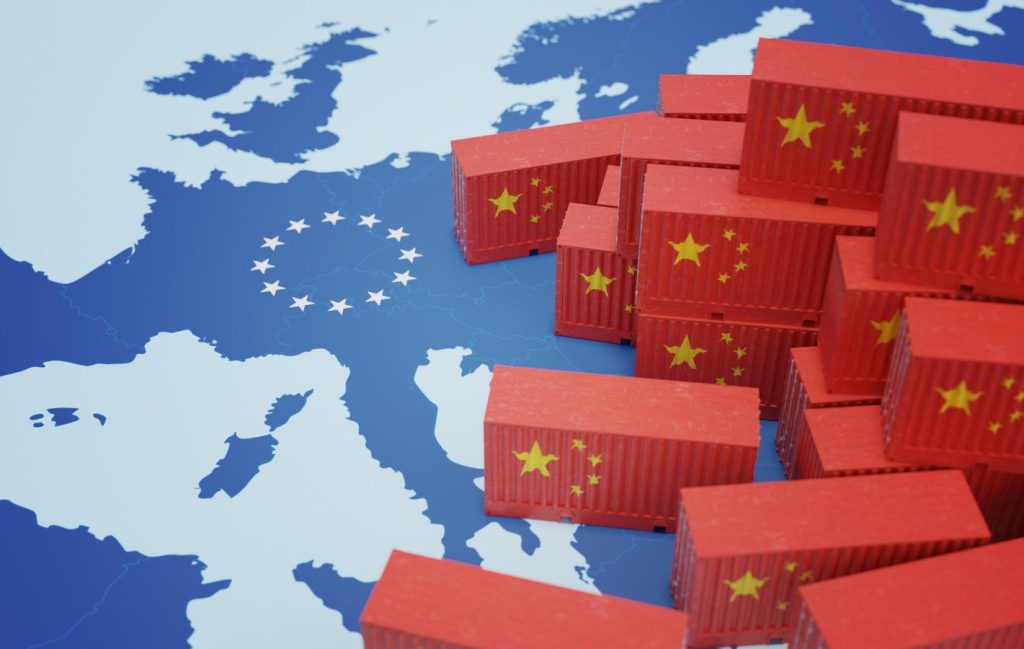The European Automotive industry is nervously looking east to see the scope of reaction to the EU’s provisional decision to add penalty tariffs on Chinese electric vehicles, alleging illegal subsidies.
Unfortunately for Europe, retaliation might not be limited to auto manufacturers.
Initially, the questions were straightforward. What are the implications of the European Union’s tariff attack on China’s electric vehicle imports? Will it go ahead at all on anything like the scale proposed by the EU? If it does, how many new factories will be built in Europe, or what kind of joint ventures can we expect to produce the affordable EVs Europeans require to fulfill the EU’s 2035 CO2 mandates?
German automakers like BMW, Mercedes, Volkswagen and Porsche were seen as likely victims of Chinese retaliation because their huge imports of high-priced upmarket vehicles were sitting ducks. Stock prices dived.
Since then, the scope of any possible retaliation has expanded to include other industries with much more serious implications for EU trade.
Reuters’ BreakingViews column put it this way.
“The European Union is getting more than it bargained for. Following the bloc’s move last week to slap tariffs on imports of electric vehicles made in China, Beijing has opened an anti-dumping investigation into imported pork and its byproducts. It’s a smart move by Beijing,” BreakingViews columnist Hudson Lockett said.
After the initial announcement, Germany expressed a strong voice for free trade and against the raised tariffs, clearly buoyed by the needs of its important automakers. France, with fewer investments in the China auto industry, was happy to go along with the proposed tariffs, which proposed increased duties of up to 38.1% for SAIC and its MG brand, BYD 17%, and Geely 20%, on top of the basic 10% tariff.
But China has apparently hinted at widening its scale of possible retaliation to include big European earners like French wine, cognac and agricultural products, Toulouse-France based Airbus Industrie, and now pork exports which are led by Spain, the Netherlands, Denmark and France, according to BreakingViews.
China initially denounced the planned tariffs as “blatant protectionism” that lacked a “factual and legal basis”. Later reports from China suggested a less harsh reaction might lead to compromises, but this talk of widening Chinese reaction to other crucial EU industries suggests a hard-ball attempt to force the EU to concede.
“Nobody wants a trade war with China,” Automotive News Europe quoted Volker Wissing, transport minister from the German government’s Free Democrat coalition partner, as saying.
“It would be a catastrophe for Germany and it would not be beneficial for the European Union, either,” Wissing said.
In a report, Fitch Ratings found that even though the headline increases sounded ominous for China, they wouldn’t materially affect the competitive landscape in the short-term. It pointed out that the EV market in Europe has underperformed compared with expectations.
“However, if China retaliates, particularly with broader measures covering other types of vehicles, or even other industrial sectors, German automakers would be most affected,” Fisk Ratings said in the report.
“The impact of potential broader measures would weigh on German automakers’ margins and cash flow generation. However, we expect their existing headroom to help absorb these pressures without their ratings being affected,” Fitch Ratings said.
Longer-term implications are less clear, the report said.
Fitch said German automakers’ exports to China accounted for 10% of their sales, mostly of luxury, high-margin models. Any new tariff (25% extra has been mooted) probably would be absorbed by customers.
Even if Chinese prices were forced sharply higher in Europe, these sales are likely to be more profitable than those in the cut-throat home market. Beyond 2025 and 2026, European automakers are likely to have “affordable” EV models available for the mass market, when competition was likely to intensify, Fitch said.
Rhodium Group had said at tariff levels lower than 50% Chinese EVs would still be profitable because of their more efficient manufacturing. Investment bank UBS has said that gives the likes of BYD a 30% cost advantage.
EV sales in Europe have stalled at around 2 million a year after initial seemingly unstoppable momentum petered out. Sales must quickly gain pace if they are to reach a predicted 9 million by 2030. Even this level would lag behind EU and U.K. targets that EV sales reach about 80% of overall vehicle sales in 2030 on the way to 100% by 2035.
Last year Allianz Trade said Chinese-built EVs could cost European automakers €7 billion ($7.7 billion) a year in lost profits by 2030 unless the EU acts to either raise tariffs, boost battery and other technology, or persuade China to build cars in Europe.
Read the full article here
















